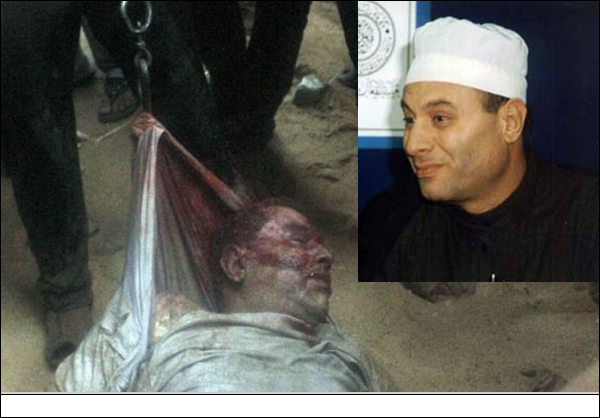An Egyptian court has sentenced 23 extremist Salafi mobs to 14 years in jail without parole over the killing of four members of the Shia community in 2013, judicial sources say.
Eight other defendants were acquitted of charges related to the lynching during Saturday's verdict, which the defence said it would appeal, the Reuters news agency reported.
The four men, one of whom was a prominent religious leader, were martyred in June 2013 when a mob stormed a house in a small village near Cairo, angry just for that a Shia religious ceremony had been performed.
Sheikh Hassan Shehata and his supporters performed a ritual celebrating a revered religious figure inside his home in the village of Abu Nomros in Giza governorate, west of Cairo.
The crowd threw petrol bombs at the house, which caught fire, and the bodies of the victims were savagely dragged through the streets.
Egypt is predominantly Sunni Muslim and Shia, who form only a small minority of the 90-million-strong population, keep a low profile.
Egypt has long been criticised by foreign governments and international rights groups for discriminating against its religious minorities, including Bahais, Shia and Coptic Christians.
According to experts and religious leaders, one of the main reason of toppling Mohammad Morsi was killing of four innocent Shia Muslims including Sheikh Shehata, and Mohammad Morsi’s interaction with the terrorist groups that were the puppet of the US and the Zionist regime.
According to Iraqi Shiite cleric, Ayatollah Sayed Ali Husseini: “Sheikh Hassan Shehata and his followers were the loyal soldiers of Islam and by sacrificing themselves they [actually] defended the doctrine of Prophet’s progeny and the Shia religion", He addded "It’s unfortunate that a country which was contemporary with Fatimids’ era once and was a propagator of religious of prophet’s progeny has now become the asylum of excommunicate terrorists”.
“Refusing to put the killers of Sheikh Hassan Shehata and his companions on trial made the fate of Morsi and Mubarak the same. Because the blood of martyr Shehata plagued Morsi.” He said at the end.
Who is martyr Sheikh Hassan Shehata?
Hassan Bin Muhamad Bin Shehata Bin Mousa al-Anani, Known as Sheikh Hassan Shahate, was born in November 10, 1946 in the small town of Harbit, Markaz Abu Kabir, in al-Sharqiyah province of Egypt.
He was a prominent Shia cleric who had thousands of followers due to his moderate views and his denouncement of radical and extremist movements in Egypt.
He was one of the main religious figures advising the Egyptian army and was an Imam of one of the most important mosques in capital Cairo.
He was well known for telling people about the nature of extremist groups and radical thoughts which are common in Egypt due to powerful presence of radical Salafist groups.
His enlightenment was not welcomed in the ruling system.
In 2009 Sheikh Hassan spent some time in jail under the government of ousted Egyptian president Hosni Mubarak due to his speeches against radical movements harming Islam. 306 of his followers were also detained along with him.
This wasn’t the first time he was arrested; before that he was arrested in 1996 for what the then authorities called desecration of religions.
On June 23, 2013, Sheikh Hassan was brutally attacked at a gathering in the village of Zawiyet Abu Musalam by more than a thousand of Salafist extremists and along with 3 of his companions was harshly beaten to death.
In Egypt, the small Shia population is harassed by the authorities and treated with suspicion, being arrested - ostensibly for security reasons - but then being subjected to torrents of abuse by state security officers for their religious beliefs.
The Arab country has been witnessing a rise in hate crimes against Shias, which analysts believe is due to widespread anti-Shia propaganda by extremist Wahabis aimed at encouraging people to go fight alongside terrorists in Syria.
Critics warn that militant extremists are acting with dangerous impunity.
Murder of Sheikh Hassan
The brutal attack on Sunday (June 23, 2013) in the village of Zawiyet Abu Musalam, near the Pyramids of Giza, came as about 30 Shias were having a meal to mark a religious occasion. Hundreds of young men descended on them in the house.
In online videos of the killings, young men armed with metal and wooden clubs, swords and machetes, beat the Shias on the head and back, trapping them in the narrow entrance of the house.
The Shias beg for mercy as blood streams down their heads and soaks their robes. A crowd pressing around them triumphantly chanting and shouting. Some screamed "You sons of dogs!"
One video shows a young man dragging the motionless and bloodied body of one victim by a rope.
The videos appeared genuine and conformed with Associated Press reporting on the attack.
Afterward, the attackers congratulated each other, one witness, local activist Hazem Barakat, said in written and video account of the events he posted online.
He said that in the weeks preceding the attack, ultraconservative Salafist clerics in the area had been speaking out against Shias.
Salafis, a radical movement of Sunnis, view Shias as heretics and regularly denounce them on TV talk shows, websites and in mosque sermons.




/129

